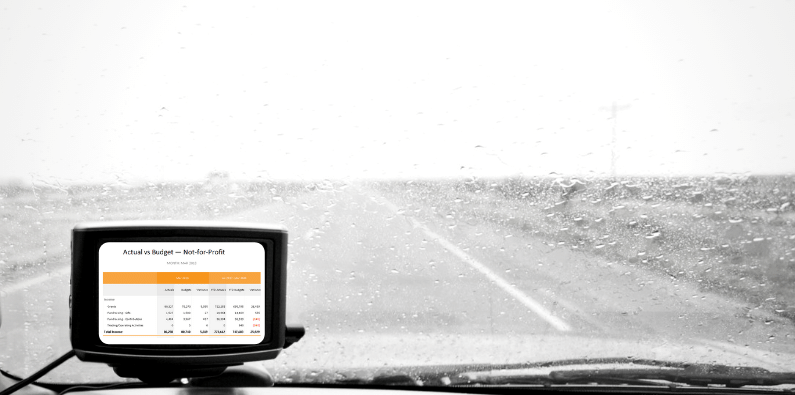How do budgets guide your business to your planned destination? We often get asked this.
A wise man once described accounting as like driving a car using only the rear-view mirror. It gives you a good idea of where you’ve been but very little indication of where you are going or what twists and turns may be on the road ahead. That wisdom came from no other than John Birse, best known for his time at Jim’s Bookkeeping and and the Institute of Certified Bookkeepers and now mentor and coach to bookkeepers.
Budgets Guide your Business
Simply put, the destination is what Counts.
Budgets are the GPS your business needs to guide you to your planned destination. They help you choose the best route and avoid potential roadblocks.
A good budget isn’t a straightjacket for your business like the corporate budgets of the 20th century. Like a SatNav, it adapts to changing conditions and helps you see alternate routes to your goal. Where there are obstacles on one road it can help you identify the other options. It needs to re-calculate when the direction changes ever so slightly.
When you’re setting off on a long trip, your first thought is generally the destination. It’s rarely “I want to drive 10,000km”, unless you’re going on a long rambling holiday where the route and destination don’t matter. In business the destination does matter. If you’re not driving towards it, you’re not going to get there.
What’s the destination of your business?
Generally, it’s to earn a certain level of profit, though it could equally validly be to increase the value of the business. In small businesses, it’s often about earning enough to stay comfortably afloat while putting some aside for a rainy day. If you’re running a Not-for-Profit organisation, your destination could be expressed more in terms of the people you will help.
A budget is a tool to guide you on your business journey. You need to have a goal for your business and a plan for getting there. The budget then applies the numbers to that plan and helps you validate whether or not it’s practical. It helps you refine the plan, to adjust it to steer it towards your goal.
Scenario Modelling
Once you’ve chosen your destination, your budget will help you work out the best route to get there and this is where it’s important to not think of the budget as singular.
Think of multiple scenarios.
If you are building or selling a product, will you get to your destination quicker by selling many of them at a low price or a few at a high price? Model the different options, think about the effort and skills required for each. Consider which option would be best for you and it’s not always the one that initially looks the fastest. If you’re riding a Vespa there may not be much benefit in taking the freeway to get to your destination and you may as well enjoy the country lanes. Or, know that you need to invest in a more powerful vehicle.
Budget Is A Decision-Making Tool
Like a SatNav, a budget is a decision-making tool. On its own, it won’t get you anywhere – every plan needs to be implemented to become more than a plan – but it will help you evaluate the different options. It will help you choose the best route as circumstances change. And sometimes, in business as with driving, you’ll take a wrong turn and you’ll need that “route re-calculation”.
By monitoring your budget on a monthly basis you’ll know quickly when you’ve made a mistake, you’ll be able to review your options for your next steps and continue on your journey. Compare your budget to your actual results and examine the variances. Did they occur because of an unexpected one-off activity or is there something that needs to change in the budget going forward? Variances tell you a story about your business and will help you learn more about how it works. Use them to adjust your plans for the future and you’ll be a step closer to your destination.
Bon voyage!
